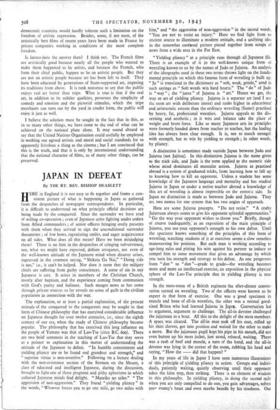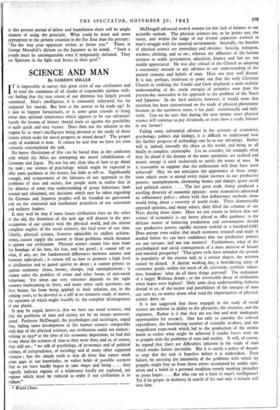JAPAN IN DEFEAT
By THE RT. REV. BISHOP HEASLETT
IIERE in England it is not easy to fit together and frame a con- sistent picture of what is happening in Japan as gathered from the despatches of newspaper correspondents. In particular, it is difficult to understand on what principle official decisions are being made by the conquered. Since the surrender we have read of willing co-operation ; even of Japanese units fighting under orders from Allied commanders ; of senior officers bringing costly presents with them when they arrived to sign the unconditional surrender documents ; of low bows, ingratiating smiles, and eager acquiescence on all sides. What does all this mean? Have we been misjudging them? There is no hint in the despatches of cringing subservience, nor, tvhat we might have expected, defiant arrogance, not even Of the well-known attitude of the Japanese mind when disaster arises, expressed in the common saying, " Shikata Ga Nai," "Doing side is not," i.e., it can't be helped. Nor does it seem that the military chiefs are suffering from guilty consciences. A sense of sin in any Japanese is rare. It arises in members of the Christian Church, mostly after baptism, and the experience coming from communion with God's purity and holiness. Such meagre news as has come through private sources so far reveals no sense of guilt in the civilian population in connection .with the war.
The explanation, or at least a partial explanation, of the present attitude of the conquered to the conquerors may be sought in that form of Chinese philosophy that has exercised considerable influence on Japanese thought for over twelve centuries, i.e., since the eighth century of our era, when the study of Chinese philosophy became popular. The philosophy that has exercised this long influence on the people of Yamato was that of Lao-Tse (circa B.C. 600). There are two brief sentences in the teaching of Lao-Tse that may serve as a pointer to explanation in this matter of understanding the attitude of the Japanese to defeat. "In. humble contentment and yielding pliancy are to be found real grandeur and strength," and "superior virtue is non-assertive." Following on a lecture dealing with the non-resistance section of the Sermon on the Mount, a class of educated and intelligent Japanese, during the discussion, brought to light one of those pregnant and pithy aphorisms in which cultured Japanese minds find delight. " Muteiko no teiko." "The aggression of non-aggression." They found "yielding pliancy" in the words, "Whoever forces you to go one mile, go two miles with him," and 'the aggression of non-aggression" in the sacred -words "You are nor to resist an injury." Here we find light from ar ancient source to illuminate a modern attitude, and a unifying ided in the Somewhat confused picture pieced together from scraps of news from a wide area in the Far East.
"Yielding pliancy" as a principle runs through all Japanese life There is an example of it in the well-known unique form of wrestling known to us by the names of Judo or Jujutsu. An analysis of the ideographs used in these two terms throws light on the funda- mental principle on which this famous form of wrestling is built up. " Ju " is translated in the dictionary as" soft, weak, gentle," used in such sayings as "Soft words win hard hearts." The " do " of Judo is " way " ; the " jutsu " of Jujutsu is "art." Hence we get, the way or art of yielding pliancy. Jujutsu is a separate art (and I use the term art with deliberate intent) and ranks higher in educational and aristocratic esteem than the ordinary wrestling (Sumo) practised by heavy, fat, professional wrestlers. Jujutsu appeals to the dis- cerning and aesthetic ; in it wits and balance take the place of weight and brute force. Like so many Japanese arts its principles were formerly handed down from teacher to teacher, but the leading idea has always been clear enough. It is, not to match strength with strength, but to win by yielding to strength ; in other, words, by pliancy.
A distinction is sometimes made outside Japan between Judo and Jujutsu (not Jujitsu). In this distinction Jujutsu is the name given to the trick side, and Judo is the term applied to the esoteric side whose mind dominates all muscular action. Jujutsu as practised abroad is a system of graduated tricks, from learning how to fall up to knowing how to kill an opponent. Unless a student has some knowledge of the Japanese language and mentality and has studied Jujutsu in Japan or under a native teacher abroad a knowledge of this art of wrestling is almost impossible on the esotoric side. In Japan no distinction is made as between Judo and Jujutsu. They are two names for one system that has two angles of approach.
Here are some Jujutsu precepts. "Do not resist." "A crafty Jujutsuan always seems to give his opponent splendid opportunities." "Go the way your opponent wishes to throw you." Briefly, though of course inadequately, as an exposition of the main principle of Jujutsu, you use your opponent's strength to his own defeat. Until the spectator knows something of the principles of this form of wrestling, watching students of it at exercises seems a slow senseless manoeuvring for position. But each man is working according to age-long rules and pitting his wits against his partner to induce or compel him to some movement that gives an advantage by which you turn his strength and strategy to his defeat. , As one progresses from " dan " to "elan "—grade to grade—the wrestling becomes more and more an intellectual exercise, an exposition in the physical sphere of the Lao-Tse principle that in yielding pliancy is true strength.
In the mess-room of a British regiment the after-dinner conver- sation turned on wrestling. Two of the officers were known to be expert in that form of exercise. One was a good specimen in muscle and bone of all-in wrestlers, the other was a normal good- sized Briton who had learned Jujutsu in Japat. Conversation led to argument, argument to challenge. The all. in devotee challenged the jujutsuan to a bout. All this to the delight of the mess members. A space, was cleared. The aPin man took off his coat, rolled up his shirt sleeves, got into position and waited for the other to make a move. But the jujutsuan pupil ,kept his pipe in his mouth, did not even button up his mess jacket, just stood, relaxed, waiting. 'There was a rush of beef and muscle; a turn of the hand, and the all-in devotee was lying in the corner of the room, rubbing his head and saying, "How the ---- did that happen?"
In my years of life in Japan I have seen numerous illustrations of this principle of yielding pliancy in action. Groups and-indivi- duals, patiently waiting, quietly observing until their opponent takes the false step, then striking. There is an element of wisdom in this philosophy. In yielding pliancy, in doing the second .mile when you are only compelled to do one, you gain advantages, soften your enemy's heart and even maybe benefit by his tiredness. Out
or this present period of defeat and humiliation there will be ample chances of using the principle. What could be wiser and more appropriate to the present situation in the Far East than the precept: "Go the way your opponent wishes to throw you." There is George Meredith's dictum on the Japanese to be noted. "Such a people must be unconquerable even if temporarily defeated. They arc Spartans in the fight and Stoics in their grief."































 Previous page
Previous page